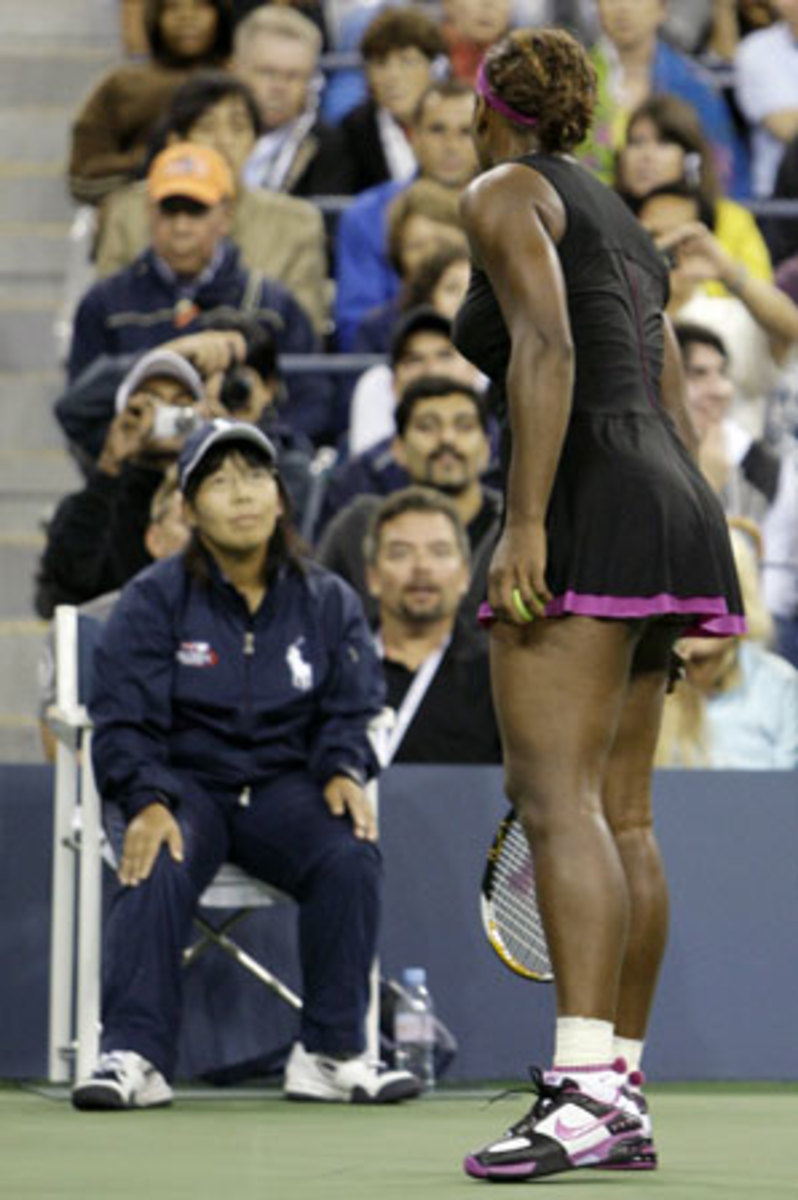Serena's outburst common among athletes -- but not women


I've seen too much in sports to be outraged by Serena Williams' outburst at the U.S. Open last weekend. I've seen world class athletes head-butt opponents, spit in the face of umpires, fire lethal serves at linespeople, tackle aging bench coaches.
I've seen it all. But rarely from a woman.
Which is why I can't help but think that the outrage unleashed toward Williams in the past two days has something to do with her gender. She's playing the sport of frilly underpants and dangly earrings, yet she came off last weekend as unhinged as Mike Tyson.
Athletes lose it sometimes. They act foolish. They don't apologize when we want them too. It happens all the time.
But rarely with a woman.
Williams has broken the mold for female athletes, with her muscles and power and unapologetic self-promotion. Now she's done it in another arena: proving that women, too, can have moments of egregious unsportspersonlike conduct.
On Monday Williams apologized. She'd already made a post-meltdown statement, but this was the first time she directly apologized to the linesperson that she berated. Then she went out and won the doubles title with her sister Venus in straight sets, earning $420,000, which she'll split with Venus but will more than help cover the $10,000 she was fined for her outburst on Saturday night (she was also docked an additional $500 for throwing her racquet).
The small mid-Monday crowd cheered supportively. And when Patrick McEnroe persisted in questioning Williams about her eventful weekend, it was McEnroe who was booed. Not Williams.
Maybe the crowd at Arthur Ashe Stadium was sniffing out a double standard: that the brother of the most famous tantrum-thrower in the history of the sport was tsk-tsking Williams. But more than likely the crowd was just doing what fans do: forgiving the transgressions of an athlete that they enjoy watching. An athlete that they were robbed of seeing complete her singles run on Saturday night.
An athlete who just happens to be a woman.
We'll see if the tennis establishment will be as forgiving. They don't much like Williams, never really have. The muckety-mucks don't think she's properly respectful of the sport. The tennis media thinks she's a phony and condescending. In the reaction to Saturday, there's definitely a whiff of "Finally, Serena's getting what she deserves." A suspension is still under consideration.
Make no mistake, what Williams did was outrageous. Rude. Crude. Embarrassing. Just like the behavior we've seen from so many male athletes over the years. But the situation never should have gotten to that point. The foot-fault call itself was a ticky-tacky questionable call made by a tone-deaf official -- a call that should never have been called at that point in a Grand Slam semifinal.
When Williams made her first move toward the linesperson, the chair umpire should have intervened. Instead, the umpire let the situation unravel out of control.
It was a startling contrast to the infamous second-round match from the 1979 U.S. Open, which CBS happened to show Friday during a rain delay. In that match between Ilie Nastase and John McEnroe, Nastase's antics brought the match to an 18-minute standstill. After the chair umpire awarded game-set-match to McEnroe and the crowd went mutinous, the umpire was replaced and a new umpire allowed the match to continue. That was the prudent decision.
McEnroe's bad behavior once got him disqualified from a match in the second round of the Australian Open, a Grand Slam tournament that McEnroe never won. But that was in 1990, when McEnroe was a past-his-prime player with a long, detailed history of official abuse.
Williams didn't have that history until Saturday. Or that reputation. In contrast, she has usually managed to control her emotions. She was the reigning champion. She could have easily been awarded a benefit of the doubt, a restraining hand. Yet it didn't happen.
Some of her critics think she was smart enough to calculate the whole thing, to be able to exit the semifinal without a loss. I guess that's a compliment, in a way. We usually think that male athletes who behave badly are simply idiots.
Tennis is going through a golden age of sportsmanship: Roger Federer is inordinately gracious -- well, except for hating on the replay system and cursing the chair umpire in his loss to Juan Martin del Potro on Monday. Rafael Nadal is usually all class. So maybe the way Williams behaved reverberates more loudly these days. Especially when she's playing as popular and lovable an opponent as Kim Clijsters.
(Though the breathless excitement over Clijsters return from having a baby is also evidence that women athletes are viewed as weird creatures. What Clijsters did is amazing -- winning a Grand Slam in her third tournament back. But the fact that having a baby didn't leave her completely incapacitated isn't a shock -- or was no one watching the Beijing Olympics when dozens of mothers were successful competitors? Clijsters is only 26. She got back in shape quickly. She stormed through a weakened bracket and looked awesome in the process. The truly amazing part will be if she can juggle life on the Tour and motherhood for more than a few weeks. And that remains to be seen).
Maybe Serena's era was really a quarter century ago, when McEnroe and Connors and Nastase were roaming the court. When tennis champions routinely acted like boorish fools.
McEnroe has gone on to make a cute little post-retirement career of his anger management issues and his vicious berating of officials. Maybe Serena will too. She gave it a shot on the MTV Video Music Awards, making a lame joke about a foot-fault (and taking a backseat to Kanye West for ungracious behavior).
If Williams goes on to turn her egregious behavior into a publicity coup it will be something we've seen before from plenty of other athletes.
But not from a woman.
